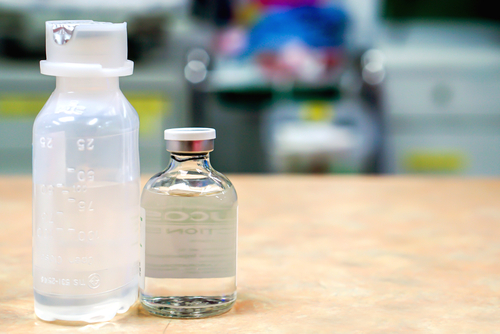Lymphoma patients’ response to Sandoz’s biosimilar therapy GP2013 was similar to their response to the treatment from which it is derived, Genentech’s Rituxan (rituximab), a Phase 3 clinical trial indicates.
Sandoz presented the results of the ASSIST-FL trial (NCT01419665), which involved patients with newly diagnosed, advanced follicular lymphoma, at the European Society for Medical Oncology Congress in Madrid, Sept. 8-12. The presentation was titled “Equivalent Efficacy of a Biosimilar Rituximab and Reference Rituximab in Previously Untreated Advanced Follicular Lymphoma: Extended Results of ASSIST-FL, a Confirmatory Phase III Study.”
A biosimilar is a nearly identical but cheaper version of the treatment on which it is based. The company making a biosimilar can do so legally when the patent to the original product expires.
Before a company can make a biosimilar, however, it must conduct clinical trials showing that it is as effective and safe as the original.
Sandoz, a division of the Swiss pharmaceutical giant Novartis, designed GP2013 to mimic the composition and effects of Rituxan. Sandoz had already conducted a trial (NCT02514772) showing that GP2013 is equivalent to Rituxan as a rheumatoid arthritis treatment.
To assess whether GP2013 was equivalent to Rituxan as a treatment for follicular lymphoma, Sandoz randomized patients in the ASSIST-FL trial to receive one of two therapy combinations. Some patients received GP2013 and the standard chemotherapy CVP (cyclophosphamide, vincristine, and prednisone). Others received a combination of Rituxan and CVP.
The 629 lymphoma patients had never been treated. Each received eight cycles of therapy, after which those who responded to treatment received GP2013 or Rituxan alone for two more years.
The primary objective of the study was to see whether patients would respond as well to GP2013 as to Rituxan. The overall response rate — those who achieved either a complete or partial response to treatment — was almost identical: 87.1 percent in the GP2013 group and 87.5 percent in the Rituxan group.
The groups’ overall survival rates were similar as well. Ninety-three percent of the GP2013 group were still alive after treatment, versus 91 percent in the Rituxan group. The Rituxan group had a slight edge in progression-free survival — the time it takes for a patient’s disease to progress. Seventy-six percent of the Rituxan group had had no progression of their disease, compared with 70 percent of the GP2013 group.
Researchers said the safety and immune-response profiles of the two groups were also similar.
Overall, the findings supported the notion that GP2013 is a bioequivalent of Rituxan, researchers said.
It represents an alternative, cost-saving option for those who need anti-CD20 antibodies, they added.
The European Union has approved GP2013 under the brand name Rixathon since June 2017. The authorization covers the same conditions that it approved Rituxan for. Earlier this month the U.S. Food and Drug Administration agreed to review Sandoz’s application for GP2013’s approval.


